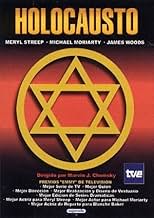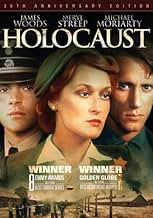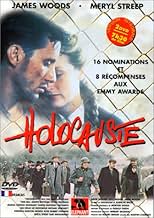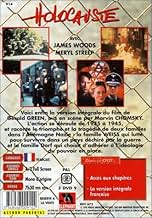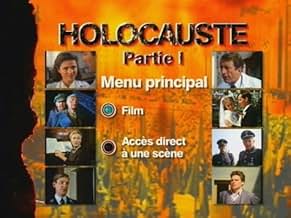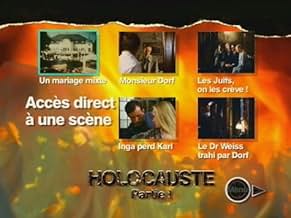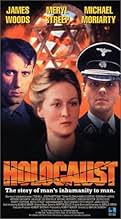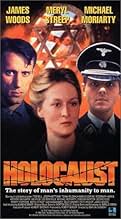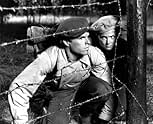IMDb RATING
8.0/10
5.8K
YOUR RATING
The saga of a Jewish family's struggle to survive the horror of Nazi Germany's systematic marginalization and extermination of their community.The saga of a Jewish family's struggle to survive the horror of Nazi Germany's systematic marginalization and extermination of their community.The saga of a Jewish family's struggle to survive the horror of Nazi Germany's systematic marginalization and extermination of their community.
- Won 8 Primetime Emmys
- 18 wins & 11 nominations total
Browse episodes
Featured reviews
Reinhart Heydrich is known by historians as having been a uniquely dangerous member of the Hitler's inner circle, as the man was not only far more intelligent than the usual Nazi thug, but completely amoral as well. Both sides are superbly bought out by David Warner as his Heydrich reveals his philosophy to Michael Moriarty's Captain Dorf - it was the high point of the miniseries. It marked Warner for me as a thinking man's villain.
"Holocaust" is a brilliantly made mini-series that made a HUGE social impact when it debuted. Here in the US, the term 'Holocaust' was rarely used before 1978 and it's become a familiar part of our lexicon since. The series follows the Weiss family from 1935-1945 and shows how these Jews fared during the Holocaust. Additionally, the Dorf family who know the Weiss family is shown as a parallel. Unlike the Weiss clan, the Dorfs are gentiles. At first, they seem like decent people but over time, they become caught up in the SS and Erik becomes one of the architects of the Final Solution. The plots are all well-written and as the Weisses are disbursed, you see how each of them is caught up in the hate and hysteria. In addition to nice direction and writing, it didn't hurt that the show had an amazingly competent cast which included Fritz Weaver, Meryl Streep, James Woods, Sam Wanamaker, Michael Moriarty and many more.
While I truly believe that this is one of the greatest mini-series events of all-time, the show is not quite perfect. One problem is NOT the fault of the filmmakers and that is that the Jewish prisoners and ghetto residents look way too healthy. You cannot starve actors enough without killing them to really approximate how awful it really was--so it is, unintentionally, a bit sanitized. Also, while it was not necessary, it would have been nice to know the dates as events unfolded. Sometimes this is given--mostly is it not.
One final note. Although the series was apparently comprised of four episodes, on DVD, it's stretched into five.
While I truly believe that this is one of the greatest mini-series events of all-time, the show is not quite perfect. One problem is NOT the fault of the filmmakers and that is that the Jewish prisoners and ghetto residents look way too healthy. You cannot starve actors enough without killing them to really approximate how awful it really was--so it is, unintentionally, a bit sanitized. Also, while it was not necessary, it would have been nice to know the dates as events unfolded. Sometimes this is given--mostly is it not.
One final note. Although the series was apparently comprised of four episodes, on DVD, it's stretched into five.
If you were only to see one movie, one television series in your life about the Holocaust (and you should see more), this would be it.
It is the most wide-ranging, most thorough examination of what happened to central and eastern Europe's Jews between 1935 and 1945. The series focuses not on one camp: but on several (Auschwitz, Theresienstadt, Buchenwald, Sobribor - and hear much of Maidenek, Dachau, and others). We see the creation and changes in the ghetto in Warsaw (and hear of the ghettos in Vilnius and elsewhere). We see the evolution in the methods of killing Jews - and why. We see what happened to those deemed defectives at yet another camp.
With two exceptions, I found the acting (by a truly stunning cast - from Nigel Hawthorne to Ian Holm, from James Woods to T.P. McKenna, from Meryl Streep to David Warner, from Rosemary Harris to Sam Wanamaker, from Fritz Weaver to Tovah Feldshuh, Robert Stephens to Deborah Norton, Michael Moriarty) superb - truly moving and powerful. The two exceptions were the daughter Anna and the son Rudy played by Joseph Bottoms. This may not be entirely their fault - their parts are so underwritten - conventional.
The fantastic aspect of this series is its scope - you really do have a grounding in the Holocaust that would serve you well reading any history, seeing any movies set in this time.
The downside is that as fine as the acting is, the series is split among the stories of six to eight people over the course of a decade - which inevitably limits how moved the audience is by the story of each. Thus, in contrast to say, Schindler's List or The Pianist, we are not living and breathing with one person and what happens to him - we do not know these characters THAT well.
I would also criticize the series as creating such one-sidedly virtuous characters in the victims. We are interested in a character in drama only to the extent that the person seems real and we can therefore wholly identify with this real breathing person. Although we do have some feeling of how James Woods' character is different from say, Joseph Bottoms', it isn't sufficient to move the drama to the greatest heights. Actors don't come better than those in this series - so I think it's really due to the nature of the series - the need to get it all in and move around all the different experiences. This better serves our education, but somewhat reduces the sense of having suffered with each individual.
This was a great and enormously expensive production. It is very worthwhile renting - and should be shown to everyone above say, the age of 12 (I'd say that a younger age is too susceptible to the horror). NBC is to be commended highly for having developed it. It's tremendous.
It is the most wide-ranging, most thorough examination of what happened to central and eastern Europe's Jews between 1935 and 1945. The series focuses not on one camp: but on several (Auschwitz, Theresienstadt, Buchenwald, Sobribor - and hear much of Maidenek, Dachau, and others). We see the creation and changes in the ghetto in Warsaw (and hear of the ghettos in Vilnius and elsewhere). We see the evolution in the methods of killing Jews - and why. We see what happened to those deemed defectives at yet another camp.
With two exceptions, I found the acting (by a truly stunning cast - from Nigel Hawthorne to Ian Holm, from James Woods to T.P. McKenna, from Meryl Streep to David Warner, from Rosemary Harris to Sam Wanamaker, from Fritz Weaver to Tovah Feldshuh, Robert Stephens to Deborah Norton, Michael Moriarty) superb - truly moving and powerful. The two exceptions were the daughter Anna and the son Rudy played by Joseph Bottoms. This may not be entirely their fault - their parts are so underwritten - conventional.
The fantastic aspect of this series is its scope - you really do have a grounding in the Holocaust that would serve you well reading any history, seeing any movies set in this time.
The downside is that as fine as the acting is, the series is split among the stories of six to eight people over the course of a decade - which inevitably limits how moved the audience is by the story of each. Thus, in contrast to say, Schindler's List or The Pianist, we are not living and breathing with one person and what happens to him - we do not know these characters THAT well.
I would also criticize the series as creating such one-sidedly virtuous characters in the victims. We are interested in a character in drama only to the extent that the person seems real and we can therefore wholly identify with this real breathing person. Although we do have some feeling of how James Woods' character is different from say, Joseph Bottoms', it isn't sufficient to move the drama to the greatest heights. Actors don't come better than those in this series - so I think it's really due to the nature of the series - the need to get it all in and move around all the different experiences. This better serves our education, but somewhat reduces the sense of having suffered with each individual.
This was a great and enormously expensive production. It is very worthwhile renting - and should be shown to everyone above say, the age of 12 (I'd say that a younger age is too susceptible to the horror). NBC is to be commended highly for having developed it. It's tremendous.
10smwise3
NBC's Holocaust is perhaps the finest miniseries I've seen on television. I purchased the two VHS set several years ago and watch it at least once a year over several nights. Holocaust features a large, excellent cast, which make up for emotion which they lack in depth. Sadly, the stories are all too familiar and have presented in one form or another, but what makes this series stand out is the fact that it was able to compress time and feature some of the best known events of the holocaust, such as Babi Yar, Sobibor and Warsaw Ghetto, seamlessly. The dual story lines tracking the Jewish Weiss family and the German Dorff family intertwine believably, and the graphic violence is appropriate for this production. Michael Moriarty was excellent as the meek lawyer who became a cold calculator and Rosemary Harris was memorable as the proud but stubborn Berta Weiss. Meryl Streep and James Woods also are noteworthy, and it's a delight to see both actors in early roles. I recall when Holocaust debuted it became a media event and school project, with study guides for classroom discussion. I wonder if some of the material was appropriate for some young audiences.
Holocaust was a typical made for TV mini series that were made back in the late 1970's. It followed on the back of the well acclaimed series ROOTS and was later was followed by the WINDS OF WAR and others. Having seen this recently although it's still effective and interesting Holocaust looks a bit wooden and dated by today standards. In addition in the 30 years since there have been a lot of documentaries, movies and other big screen stuff which has perhaps detailed the horrors in a more graphic way as well as providing an even more nightmarish and depressing insight into what Europe's Jews had to endure during Hitler's reign.
It's mostly an American and British cast, typically the Weiss family and the Jews are played by the American actors and the Brits play the Germans. Some of them were well known at the time i.e. Fritz Weaver, Sam Wanamaker and T.P. McKenna . Others such as Ian Holm, James Woods and Meryl Streep would soon become household names.
It follows the fait of the Weiss family and details on an individual basis how they all coped with the changing anti-Semitic conditions in Germany and their suffering until the war was over. Also a German called Erik Dorf was added to the story who was destined for a legal career but decided to join the SS. He moved through the ranks and became one of the most enthusiastic defenders of the final solution. To some extent they were trying to rationalize how well educated people became brain washed. He was played by Michael Moriarty and did not come across as evil, certainly not at the beginning. He never personally carried out killings but just gave orders and watched from the side lines. Watching the change in him as the episodes unfolded is chilling.
Over the years there have been numerous documentaries and movies made which show the hell of the Holocaust but what this series did was tell people things that weren't widely known back in 1978. Although it was well known that the Jews were gassed and put into concentration camps most of my knowledge about this period as well as the war as a whole was based on war films and the British documentary series THE WORLD AT WAR. HOLOCAUST depicts the events that unfolded and how the Jews found themselves in such a hopeless situation! By January 1942 there was to be a fully fledged war against the Jews. The methods of disposal were seemed to be too slow and crude. More efficient ways of extermination had to be found to accelerate the process and make the policy more efficient now that Hitlers initial objectives were unraveling on the eastern front.
When I first watched Holocaust I wondered why the Jews didn't put up more of a fight, why so many of them just went to their deaths? Now watching it today two things struck me. After being dehumanized, humiliated, starved and stripped of dignity, they were simply exhausted, frightened and resigned to their fait. Also, most of them were children, old men and women who up against armed soldiers had no chance. Also their predicament was difficult, where do you hide wearing striped pajamas or a star of David on your tunic? Many escapees were betrayed by neighbors and non-Jews. Indigenous governments either through fear of because of Nazi sympathy just capitulated and cooperated with German requests for the Jews to be deported. Events such as Sobibor where out of the 600 who initially escaped only 60 survived the war, not a great success rate. Also, the Warsaw uprising which was eventually crushed in 1944 only highlighted the futility of their position!
The other point and this arouses controversy is that more people died in the war itself, why concentrate on the holocaust? It's true that many others, political prisoners, and other ethnic groups were massacred too. Also, more money and lives were spent and lost during the war than the killing of the 6 ½ million Jews, why the distinction?
Firstly, the Jews were the largest ethnic group that were killed despite being dispersed all over Europe. Secondly their treatment started way back in the 1930's and of course accelerated up until and in some cases even after the German surrender. Jews were being Killed, massacred and forced on death marches right up until the end of the war. Thirdly, the Germans got the art of killing these none combatants down to a fine art, they industrialized death and suffering in such a way that I don't know if there is anything historically to compare with it? Every step of the way they took away hope and there was a cruel deception right the way down the line, all able bodied were concentrated and enslaved until no longer useful and the others were killed quickly or slowly, which ever suited . By the time they realized what was going on it was too late! They simply never believed the Germans would do such a thing!
It was cruelty towards an ethnic group, whole familys which included, the old, the sick and children were all tormented. The perpetrators of this policy and it's executioners took delight in what they were doing, yes, a sense of delight is the right word. I watched a documentary a couple of years ago where a survivor of a camp a Dutch Jew, I think his name was Joseph Greenberg learned a year after the end of the war that his family were probably all killed on the same day they arrived at the death camp. It still haunted him all these years later. This is the enduring legacy of the perverse and twisted war against Europe's Jews. Well worth watching!
It's mostly an American and British cast, typically the Weiss family and the Jews are played by the American actors and the Brits play the Germans. Some of them were well known at the time i.e. Fritz Weaver, Sam Wanamaker and T.P. McKenna . Others such as Ian Holm, James Woods and Meryl Streep would soon become household names.
It follows the fait of the Weiss family and details on an individual basis how they all coped with the changing anti-Semitic conditions in Germany and their suffering until the war was over. Also a German called Erik Dorf was added to the story who was destined for a legal career but decided to join the SS. He moved through the ranks and became one of the most enthusiastic defenders of the final solution. To some extent they were trying to rationalize how well educated people became brain washed. He was played by Michael Moriarty and did not come across as evil, certainly not at the beginning. He never personally carried out killings but just gave orders and watched from the side lines. Watching the change in him as the episodes unfolded is chilling.
Over the years there have been numerous documentaries and movies made which show the hell of the Holocaust but what this series did was tell people things that weren't widely known back in 1978. Although it was well known that the Jews were gassed and put into concentration camps most of my knowledge about this period as well as the war as a whole was based on war films and the British documentary series THE WORLD AT WAR. HOLOCAUST depicts the events that unfolded and how the Jews found themselves in such a hopeless situation! By January 1942 there was to be a fully fledged war against the Jews. The methods of disposal were seemed to be too slow and crude. More efficient ways of extermination had to be found to accelerate the process and make the policy more efficient now that Hitlers initial objectives were unraveling on the eastern front.
When I first watched Holocaust I wondered why the Jews didn't put up more of a fight, why so many of them just went to their deaths? Now watching it today two things struck me. After being dehumanized, humiliated, starved and stripped of dignity, they were simply exhausted, frightened and resigned to their fait. Also, most of them were children, old men and women who up against armed soldiers had no chance. Also their predicament was difficult, where do you hide wearing striped pajamas or a star of David on your tunic? Many escapees were betrayed by neighbors and non-Jews. Indigenous governments either through fear of because of Nazi sympathy just capitulated and cooperated with German requests for the Jews to be deported. Events such as Sobibor where out of the 600 who initially escaped only 60 survived the war, not a great success rate. Also, the Warsaw uprising which was eventually crushed in 1944 only highlighted the futility of their position!
The other point and this arouses controversy is that more people died in the war itself, why concentrate on the holocaust? It's true that many others, political prisoners, and other ethnic groups were massacred too. Also, more money and lives were spent and lost during the war than the killing of the 6 ½ million Jews, why the distinction?
Firstly, the Jews were the largest ethnic group that were killed despite being dispersed all over Europe. Secondly their treatment started way back in the 1930's and of course accelerated up until and in some cases even after the German surrender. Jews were being Killed, massacred and forced on death marches right up until the end of the war. Thirdly, the Germans got the art of killing these none combatants down to a fine art, they industrialized death and suffering in such a way that I don't know if there is anything historically to compare with it? Every step of the way they took away hope and there was a cruel deception right the way down the line, all able bodied were concentrated and enslaved until no longer useful and the others were killed quickly or slowly, which ever suited . By the time they realized what was going on it was too late! They simply never believed the Germans would do such a thing!
It was cruelty towards an ethnic group, whole familys which included, the old, the sick and children were all tormented. The perpetrators of this policy and it's executioners took delight in what they were doing, yes, a sense of delight is the right word. I watched a documentary a couple of years ago where a survivor of a camp a Dutch Jew, I think his name was Joseph Greenberg learned a year after the end of the war that his family were probably all killed on the same day they arrived at the death camp. It still haunted him all these years later. This is the enduring legacy of the perverse and twisted war against Europe's Jews. Well worth watching!
Did you know
- TriviaThe term "Holocaust" didn't exist in the German language until the 1980s. Due to the great success of this mini-series, it became common knowledge, and was chosen as "word of the year 1979" by the "Gesellschaft für deutsche Sprache" (Society for German Language).
- Quotes
Moses Weiss: I have the right name but I'm afraid I can't lead you to the promised land.
- Alternate versionsPolish authorities protested against a scene in which soldiers dressed in Polish uniforms executed Jewish prisoners. The poles didn't have any "Quisling army" during the war. The scene was trimmed and now shows the rifles and the arms of the soldiers in question. Even so, both versions apparently remained in circulation as Danish TV originally showed the original version, and Swedish TV the trimmed version within weeks of each other.
- ConnectionsFeatured in The 30th Annual Primetime Emmy Awards (1978)
- How many seasons does Holocaust have?Powered by Alexa
Details
Contribute to this page
Suggest an edit or add missing content



